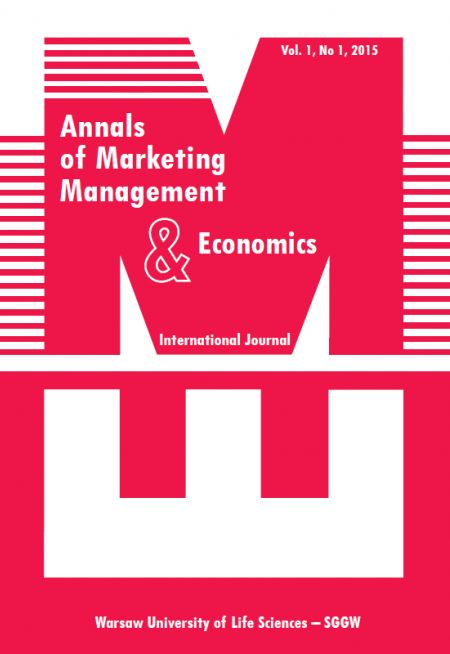Main Article Content
Article Details
Abdel-Khalik R., 2002. Incentive Compensation and Human Capital Assets, University of Illinois, Champaign. (Crossref)
Andrusenko Т., 2004. Интеграция знаний предприятия (Integration of company knowledge) [in Russian], Corporative Systems 2, 5-13, retrieved from http://corportal.ru/Articles/DataTech/KnowledgeManagement/KIE.aspx [accessed: 22.03.2017].
Bendikov М.А., Dgamaj E.V., 2001. Идентификация и измерение интеллектуального капитала инновационно активного предприятия (Identifying and Measuring Innovation- the Active Company's Intellectual Capital) [in Russian], RAS, Economic Science of Modern Russia 4, 83-108.
Bukowitz W.R., Williams R.L., 2000. The Knowledge Management Fieldbook, Financial Time, Prentice Hall, London.
Clausius R., 1868-1869. Théorie mécanique de la chaleur (The mechanical theory of heat) [in French], Eugène Lacroix, Paris.
Czajkowski Z., 2012. Kapitał ludzki - pojęcie i miary (Human capital - the concept and measures) [in Polish], Instytut Gospodarki Światowej, Prace i Materiały 312, Warszawa.
Dobija M., 1998. How to Place Human Resources in the Balance Sheet?, Journal of Human Resource Costing & Accounting, 3, 83-92. (Crossref)
Drewnowski A., Darmon N., 2005. Food Choices and Diet Costs: an Economic Analysis,The American Society for Nutritional Sciences, The Journal of Nutrition 135, 900-904. (Crossref)
Duda I., 1995. Słownik pojęć towaroznawczych (Dictionary of merchandizing concepts) [in Polish],Wydawnictwo Akademii Ekonomicznej w Krakowie, Kraków.
Ettinger Van J., Sittig J., 1965. More... through quality, International Quality Centre at Bouwcentrum, Rotterdam.
Fitzenz J., 2001. Rentowność inwestycji w capital ludzki (The effectiveness of investments in human capital) [in Polish], Dom Wydawniczy ABC, Oficyna Ekonomiczna, Kraków.
Gundersen C., Kreider B., Pepper J., 2011. The Economics of Food Insecurity in the United States, Oxford Academy, Applied Economic Perspectives and Policy 33 (3), 281-303. (Crossref)
ul HAQ M., 1995. Reflections on Human Development, Oxford University Press, New York. (Crossref)
Juran J.M., Gryna F.M., 1993. Quality Planning and Analysis, McGraw-Hill Companies.
Kolman R., 2009. Kwalitologia. Wiedza o różnych dziedzinach jakości (Qualitology. Knowledge about different aspects of quality) [in Polish], Placet, Warszawa.
Liapina S., Grygorieva T., 2003. Управление знаниями в организации как основное направление повышения конкурентоспособности (Managing Knowledge in Organizations s Basic Direction of Increase of Competitiveness) [in Russian], Vestnyk NAUFOR.
Ministry of Economic Development and Trade of Ukraine (MEDTU), 2012. State statistics service of Ukraine. Методика вимірювання регіонального людського розвитку (Methods for measurement of regional human development) [in Ukrainian], Міністерство економічного розвитку й торгівлі України. Державна служба статистики. Інститут Annals of Marketing Management & Economics Vol. 3, No 2, 2017 демографії та соціальних досліджень ім. М.В. Птухи НАН України, retrieved from http://www.idss.org.ua/ukr_index/Metodika_ua.pdf [accessed: 22.03.2017].
Ministry of Health of Ukraine (MHU), 1999. Наказ Міністерства охорони здоров'я України № 272 Про затвердження Норм фізіологічних потреб населення України в основних харчових речовинах та енергії (Order of the Ministry of Health of Ukraine on the claim of norms of physiology necessities of Ukraine's population in basic food substances and energy) [in Ukrainian], retrieved from http://zakon3.rada.gov. ua/laws/show/z0834-99 [accessed: 22.03.2017].
Miciuła I., Miciuła K., 2015. Metody pomiaru wartości kapitału ludzkiego (Nine Methods of measuring the value of human capital) [in Polish], Uniwersytet Szczeciński, "Współczesne Problemy Ekonomiczne" 11, 269-280. (Crossref)
Nonaka I., Takeuchi H., 1995. The Knowledge-Creating Company: How Japanese Companies Create the Dynamics of Innovation, Oxford University Press, New York. (Crossref)
Schmidt L., Shore-Sheppard L., Watson T., 2016. The Effect of Safety-Net Programs on Food Insecurity, University of Wisconsin Press, "Journal of Human Resources" 51 (3),588-614. (Crossref)
Sea A., 2009. The Idea of Justice, The Belknap Press of Harvard University Press, Cambridge, Massachusetts.
State Statistics Service of Ukraine (SSSU), 2014. Населення України за 2013 рік (The Population of Ukraine in 2013) [in Ukrainian], Кyiv. State Statistics Service of Ukraine (SSSU), 2016a. Витрати і ресурси домогосподарств України у 2015 році, (за даними вибіркового обстеження умов життя домогосподарств України) (The costs and resources of households in Ukraine in 2015, according to a sample survey of household living conditions in Ukraine) [in Ukrainian], Kyiv.
State Statistics Service of Ukraine (SSSU), 2016b. Баланси та споживання основних продуктів харчування населенням України (Balance sheets and consumption of basic food products by the people of Ukraine) [in Ukrainian], Kyiv.
Stepura Т., 2016. Категорія часу в дослідженні якості людського потенціалу: економічний та екологічний аспекти (Category of time in investigation of human potential quality:economical and ecological aspects) [in Ukrainian], (in:) Сучасні проблеми інформатики в управлінні, економіці, освіті та подоланні наслідків Чорнобильської катастрофи, матеріали XV Міжнародного наукового семінару, National Academy of Management, International Academy of Informatics, Kyiv, 296-300.
Turner G., 1996. Human resource accounting - Whim or wisdom, Journal of Human Resource Costing and Accounting 1 (1), 63-73. (Crossref)
Van Den Berg H., 2003. Models of Intellectual Capital Valuation: A Comparative Evaluation, Working papers Queen's University Kingston, retrieved from http://www.academia. edu/722926/Models_of_intellectual_capital_valuation_a_comparative_evaluation [accessed:22.03.2017].
VERNADSKY V.I., 1980. Проблемы биогеохимии (Problems in biogeochemistry) [in Russian], Наука, Moskow.
Aristotle's categories. Stanford Encyclopaedia of Philosophy, retrieved from https://plato.stanford.edu/entries/aristotle-categories/ [accessed: 22.03.2017].
У 2013 році серед європейських країн в Україні найбільше витратили на продукти харчування, а найменше на культуру (In 2013, among European countries Ukraine spent the most on food and the least on culture) [in Ukrainian], retrieved from http://info54 light.org.ua/content/u-2013-roci-sered-ievropeyskih-krayin-v-ukrayini-naybilshe-vitratili-na-produkti-harchuvannya-naymenshe-na-kulturu [accessed: 22.03.2017].
Zgurovsky M., Yefremov K. et al., 2014. Аналіз сталого розвитку - глобальний і регіональний контексти. Ч. 2. Україна в індикаторах сталого розвитку (Sustainable Development Analysis: Global and Regional Contexts. Part 2. Ukraine in indicators of Sustainable Development) [in Ukrainian], ICSU, Politechnika, Kyiv.
Downloads

This work is licensed under a Creative Commons Attribution 4.0 International License.





